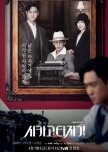
People tend to avoid tragic stories as much as they can. Perhaps, because we don’t want to be reminded of the sad realities in life.
Hymn of Death presented the story of a man and a woman who have been living to please and make sacrifices for their families when their utmost wishes are simple joys they can easily obtain on their own.
Although it is a quick drama watch, it challenged me to formulate the takeaways from Sim Deok and Woo Jin. Their story might not appeal to a general public owing to how it touches themes of alienation, depression, disobedience to parents and even forbidden affair. So, I flipped the other side to make the lessons from Hymn of Death to be more relatable and understandable.
Of course the situation of the lovers in the special drama would not fit in the modern broad-minded thinking of today’s generation. But the striking heartbreaking end of their story would shock people who will hear it even in years to come.
Not owing anyone an apology if you can’t please them because you want to live a life that is entirely your own, is the lingering impression I got from Hymn of Death. Celebrating life and finding your purpose does not need to be grand, because often times, what makes us happy are simple things and quiet solace.
I would not recommend how the main leads ultimately resolve the conflict set by the fictional world which drowned them. However, I understand the weight of emotions bottled up inside them which led to the sad closure.
Lee Jong Suk and Shin Hye Sun scored palpable portrayals which made the drama even more affecting. The emotional yet not exaggerated weep frames they both displayed were exceptional.
Esta resenha foi útil para você?

Esta resenha foi útil para você?

Doesn’t Han Se Joo’s speech sound like one of Yoo Ah In’s statements in his SNS? I would buy it if they said he was the one who wrote these particular lines. I’m sure this is yet another reason why he picked Chicago Typewriter for his final project before enlistment.
As the story goes towards the end and each character tries to recall their past life, Chicago Typewriter‘s 1930s scenes take center in most part of the episodes. The 1930s classic story of the struggle of young independence fighters is done perfectly. There’s a hinge of sorrow and joy, there’s a hint of hope and desperation. And there’s Carpe Diem– seize the day. The scenes make a lot of viewers curious and digging more into the history of Korean independence as well.
Esta resenha foi útil para você?























